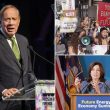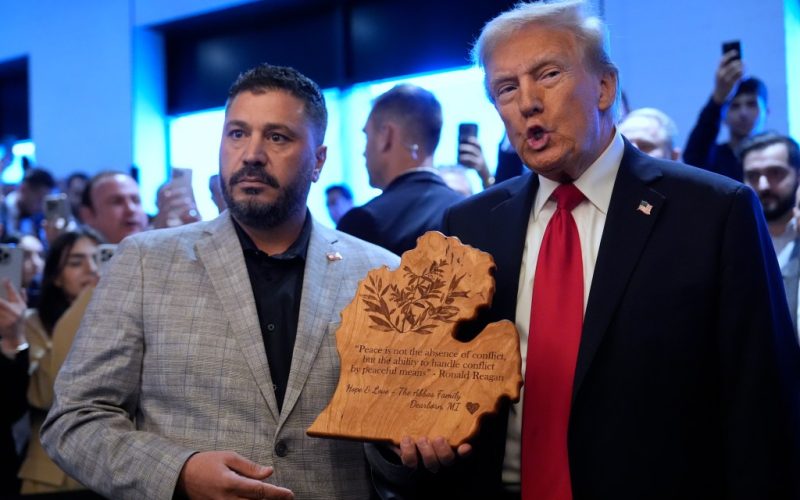On Tuesday night, for the first time in three decades, a decisive number of Muslim-American voters turned their backs on the Democratic Party.
In Dearborn Heights, Mich. — a Detroit suburb with a notable Arab-American population — support for Democrats plummeted from 74% in 2020 to just 28%, with Donald Trump capturing 47% of the vote and, ultimately, the state and its 15 electoral votes.
Despite Trump’s anti-Muslim rhetoric, including his 2017 “Muslim ban” on immigration from Iran, Iraq, Libya, Somalia, Sudan, Syria and Yemen, many Muslim voters have put their faith in him.
Even back in 2016, Trump attracted more support from Muslim voters than many expected, with 35% surveyed saying they voted for him. And that was before last year’s eruption of fresh violence in Gaza, which quickly became Kamala Harris’ Achilles heel.
Harris was blamed for the Biden administration’s arms supplies to Israel and failure to pursue ceasefire agreements. Although she had plenty of opportunities to distance herself, Harris not only refused to move the needle on his policies but failed to physically or emotionally engage the communities devastated by her inaction.
In August, she denied pro-Palestinian activists a speaking slot at the Democratic National Convention. Even when asked whether she would have done anything differently to Biden, she said, “There is not one thing that comes to mind.”
While many in Muslim strongholds like Dearborn flocked to Green Party candidate Jill Stein, who ran on a passionate anti-genocide ticket, many flirted with another possibility.
In the vital swing state of Michigan, days before the election, Bill Bazzi, the mayor of Dearborn Heights, Amer Ghalib, mayor of nearby Hamtramck, Rola Makki, vice president of outreach for Michigan’s GOP, and the prominent Imam Belal Alzuhairi came out in favor of Trump, believing that he could bring peace where Biden and Harris failed.
The rest is history.
But Trump’s new appeal to so many Muslims isn’t just about Biden’s abhorrent inaction over Palestine, nor even the fate of the Middle East. The Republican victory also stems from his conservative message on family life, immigration and religious freedom which ultimately spoke to millions of minorities.
“We as Muslims support this man because we believe that he will be a president for all Americans, embracing every race, color and religion,” said Alzuhairi at one of Trump’s final rallies.
This recent shift in voting behavior in Michigan and elsewhere across the U.S. sends a powerful message: the 1.7 million American Muslim voters — a demographic which will grow to 8.1 million by 2050 — refuse to be owned by any party or candidate.
Now begins the hard part.
This starts with Trump’s campaign pledge to pursue peace abroad. Already, the Council on American-Islamic Relations have urged the president-elect to end the war on Gaza and establish “a real peace based on justice, freedom and a state for the Palestinian people.”
But how can Trump be persuaded to deliver on his promises to Muslims? Especially when his win gilds the power of the majority Christian evangelical Supreme Court?
One thing is certain: Donald Trump will not alter his tune. The only way to get him to listen is to speak in his own language.
American Muslim communities — Republicans and Democrats alike — face a reckoning. Together, they must resist the urge to disengage from the Republican Party and instead hold the incoming Trump administration accountable.
Their Trump card? The new president will want to grow and cultivate a solid American Muslim voting bloc to support Republicans in the midterms and beyond.
American Muslim leaders must devise a clear range of political priorities and find novel ways of making their voices heard, calling on the Trump administration to rethink the approach to the Middle East, prevent any new attempt to ban Muslims from entering the U.S., and leverage diplomatic ties with Saudi Arabia and other regional powers to broker stability in Gaza, Lebanon, and beyond.
Ultimately, Harris lost support because after months of being ignored, American Muslims — and all the minorities the Democrats take for granted — did not know what she stood for. Trump’s job now is to ensure the millions of new votes for him weren’t in vain.
Ahmed is the founder and president of The Concordia Forum, a transatlantic network of cross-sector Muslim leaders, and leads Unitas Global Advisory, a reputation management consultancy specializing in intercultural communications.








